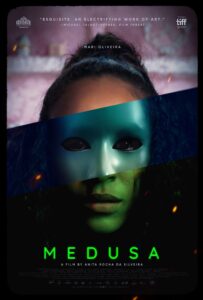In Director Anita Rocha da Silveira’s provocative new film MEDUSA, Mari and her  friends broadcast their spiritual devotion through pastel pinks and catchy evangelical songs about purity and perfection, but underneath it all, they harbor a deep rage. By day they hide behind their manicured facade, and by
friends broadcast their spiritual devotion through pastel pinks and catchy evangelical songs about purity and perfection, but underneath it all, they harbor a deep rage. By day they hide behind their manicured facade, and by  night they form a masked, vigilante girl gang, prowling the streets in search of sinners who have deviated from the rightful path. After an attack goes wrong, leaving Mari scarred and unemployed, her view of community, religion, and her peers begin to shift. Nightmares of repressed desires and haunting visions of alluring temptation become undeniable and the urge to scream and release her
night they form a masked, vigilante girl gang, prowling the streets in search of sinners who have deviated from the rightful path. After an attack goes wrong, leaving Mari scarred and unemployed, her view of community, religion, and her peers begin to shift. Nightmares of repressed desires and haunting visions of alluring temptation become undeniable and the urge to scream and release her  paralyzing inner demons is more powerful than ever before. A neon-tinged genre-bender that gives provocative form to the overwhelming feminine fury coursing through modern life, MEDUSA dares us not to look away. Director Anita Rocha da Silveira stops by to talk about the subversive take on cultural norms and gender conformity as experienced through the prism of regressive religious doctrine, vigilante justice and a corrupt political system.
paralyzing inner demons is more powerful than ever before. A neon-tinged genre-bender that gives provocative form to the overwhelming feminine fury coursing through modern life, MEDUSA dares us not to look away. Director Anita Rocha da Silveira stops by to talk about the subversive take on cultural norms and gender conformity as experienced through the prism of regressive religious doctrine, vigilante justice and a corrupt political system.
Download MP3 Podcast | Open Player in New Window
For updates and screenings go to: musicboxfilms.com/medusa
About the filmmaker – Born and raised in Rio de Janeiro, director, writer and editor Anita Rocha da Silveira has directed three short films: The Noon Vampire (2008), Handball (2010), winner of the FIPRESCI Award at the International Short Film Festival Oberhausen), and The Living Dead (2012), Cannes Directors’ Fortnight. Her first feature, Kill Me Please (2015), was screened in the Orizzonti section at Venice International Film Festival, New Directors/New Films and SXSW, among others. Medusa (2021) is her second feature film.
SOCIAL MEDIA
facebook.com/musicboxfilms
facebook.com/anitinha
twitter.com/musicboxfilms
twitter.com/anitarocha
twitter.com/Quinzaine
instagram.com/musicboxfilms
instagram.com/anitarochadasilveira
“Compelling… a queasily satirical take on matters of sex and violence among emotionally flammable youth… [with an] explicit sociopolitical critique. – Dennis Harvey, Variety
“Da Silveira sets a tone that nimbly flows between comedy, mystery and discomforting satire.” – Demetrious Matheou, Screen Daily
“An electrifying work of art.” – Michael Talbot-Haynes, Film Threat
“There’s plenty to like here: gorgeous cinematography… propulsive synth beats… and stellar performances.” – Jarek Mobarek, The Film Stage
“Da Silveira’s film seeks to dismantle this very concept of the monstrous woman, and especially how women themselves uphold it.” – Marya E. Gates, RogerEbert.com
